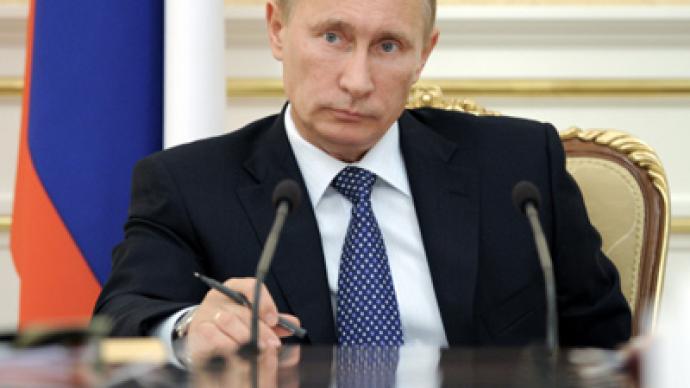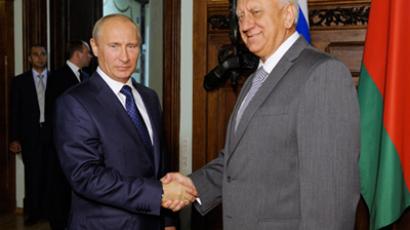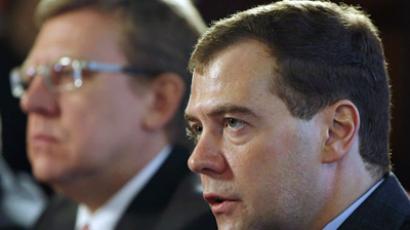One Union under Putin?

Prime Minister Vladimir Putin stirred up the political and economic waters on Monday when he announced his plans to create a ‘Eurasian Union’ made up of Russia and other post-Soviet states.
Putin, who is the front runner in next year’s presidential elections, laid out his plans in an article in Izvestia newspaper for the creation of a supranational economic union, which would be one of Russia’s major initiatives over the next six years .The Prime Minister foresees the creation of a joint economic space as a project of prime importance and will constitute a historic landmark not only for Russia, Belarus and Kazakhstan, but for all countries in the post-Soviet space.“We suggest creating a powerful supra-national union capable of becoming a pole in the modern world, and at the same time an effective connection between Europe and the dynamic Asia-Pacific Region,” Putin wrote.According to Putin’s Press Secretary Dmitry Peskov, the ambitious project will represent the centerpiece of Putin's work over the course of the next six years."Certainly, the creation of the Eurasian Union will be one of the key priorities of Putin's work over the next six years, especially given the positive dynamics of the unification process and the big amount of work that has been carried out over the four year that he has led the government," Peskov told Kommersant newspaper on Wednesday.Meanwhile, Putin stressed that Russia wants to build a new union according to new principles, while emphasizing that this has nothing to do with the “restoration of the Soviet Union,” as some western critics have already suggested.“We are not talking about resurrecting the USSR in any form, but close integration on the basis of new values, politics and economy is the order of the day,” Putin wrote.The target model closest to the Eurasian Union would be the European Union, which would necessarily imply the eventual use of a single currency – possibly the ruble – with a single issuing center, as well as the appropriate bureaucracy to govern the rules of the entire economic space.So what chances do the political analysts give to the idea of building a Eurasian Union with a common currency? Thus far, the opinions have been mixed.According to Andrey Kortunov, the president of the New Eurasia Foundation in Moscow, much still depends on the success of Russia’s ongoing modernization effort, initially kick-started by President Dmitry Medvedev. “It depends to a large extent on the success of the Russian modernization effort,” Kortunov told RT. “If Russia becomes not just a supplier of energy resources to the neighboring countries, not just a vast market for their goods, but also a locomotive for the modernization of their economies, then the Eurasian Union project has a future.” The head of the New Eurasian Foundation then drew parallels with the problems plaguing the European Union, which includes the possible default of Greece’s sovereign debt, arguing that it will be a “long, difficult road” to build an economic union.“As the problems confronting the European Union currently show, it is a long and difficult road to introduce a common economic space and currency,” he stressed. “Even now, after all the efforts put forward by the individual member states, Europe is still in jeopardy in many ways.”Thus, a common currency should not be the first step in the road to building a supranational economic union, Kortunov advises, but rather building economic ties.“A common standard, together with the synchronization of legislation, is the only then can you achieve the goal,” he said.Meanwhile, Dmitry Polikanov, deputy head of central executive committee of United Russia, the country’s majority party, said that the biggest challenge for Russia forming a supranational economic union was winning over the trust of neighbors.“First of all, it (a Eurasian Union) requires trust. So far Russia’s neighbors are quite cautious about Moscow’s integration attempts, while at the same time demonstrating little trust for each other,” Polikanov told RT in an exclusive interview.A classic example of the atmosphere of mistrust can be found in the relationships between the different countries of Central Asia, he added.What other obstacles need to be overcome before Putin’s hopes for a Eurasian Union are realized? Polikanov says it is necessary to find the right balance between economic interests and the legislations that governs trade.“It is important to understand what the economic benefits will be,” he said. “It is clear that even some Russian manufacturers are presently struggling with the new regulations within the Customs Union. So it is essential that we first find the appropriate balance of interests and harmonize the legislation.”Finally, who will benefit the most from such a multi-state union of economic interests? “We must be concerned by the rate of economic development inside of the post-Soviet space,” Polikanov stressed. “There is a gap between the capabilities and pace of the former republics of the USSR. Thus, under such conditions, will this union be an alliance of the strong, or a machine to stimulate the progress of the weak?”The United Russia deputy added that the creation of a Eurasian Union would not duplicate the functions of the Collective Security Treaty Organization (CSTO), which is a security organization.“There will be no duplication with the CSTO,” Polikanov stressed. “So far the Eurasian Union, as it is proclaimed in the article, is mainly an economic initiative, which may lead to a deeper political integration. Meanwhile, the CSTO is clearly a security alliance, which covers specific risks and has its own domain for activities.”Asked for his thoughts on introducing the Russian ruble as the common currency of the Eurasian Union, he said this was possible, but like Kortunov thought it necessary to wait on implementing a common currency.“The emergence of a single currency is a distant perspective,” he said. “The idea of making ruble a currency of the Eurasian Economic Community has long been discussed, but it would more rational to focus on immediate and medium-term economic integration goals mentioned in the article by Prime Minister Putin.”Meanwhile, Vyacheslav Nikonov, one of Russia's leading political scientists, and president of the Politika Foundation in Moscow, said that Putin is not suggesting anything that is not already in the works.“Putin is not describing something that is not happening,” Nikonov said. “He is describing the Customs Union, which will become an economic common zone union starting January 1st.”The legislative work is continuing, as is the coordination between the different economic planning bodies, he added.Nikonov went on to say that the big question regarding the creation of a Eurasian Union is Ukraine and whether it is going to join or not. "Presently, it seems that the Ukrainian authorities are not interested in such cooperation, although from an economic standpoint, such a union could be useful for all of the participants," Nikonov told RT. Finally, regarding what kind of reaction Russia can expect from the West regarding this ambitious project, Nikonov said it was "predictable.""The reaction from the West to integration projects is usually always negative," he said. "Integration against Russia is alright, but integration that involves Russia is not.”Robert Bridge, RTEvgeny Sukhoi contributed to this article














